Titanium Cookware is best for boiling water as it doesn’t distribute heat evenly. Aluminum cookware distributes heat evenly and is less likely to burn food. Aluminum cookware costs less than Titanium and slightly more weight. Aluminum Cookware is more functional than Titanium Cookware.
I love to camp, and being a Chef, I love my equipment for camping. Being able to carry light, durable equipment and does what it is supposed to do is important. In the following article, I will go through the benefits of Titanium Cookware vs Aluminum Cookware. I will give you my opinion on which is best and for what camping style. Read further if you are interested to understand more.
Titanium Vs Aluminum: Which is the BEST for you?
The Titanium vs Aluminium cookware debate has been going around the camping and hiking scene for some time.
Everyone has their favourites, and everyone swears one is better than the other. Here I will give you all the facts you need to know, give you my personal opinion, and you can decide which is best for you.
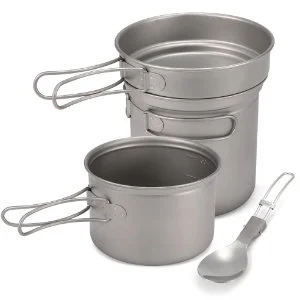
Titanium Cookware
Titanium Cookware has been flooding the market now for some time. Everywhere you look, you see Titanium pots, Titanium Pans, Titanium Spoons and Titanium Mugs. The list goes on. There seems to be a real push to get people to go Titanium with the promise of saving weight and having something more durable.
What is Titanium Cookware made of?
Regarding producing Titanium Cookware for camping, two methods are commonly used to create our Titanium cookware for camping and hiking. These processes use Pure Titanium to build cookware and reinforced Titanium Cookware.
Pure Titanium Cookware
This means that it says, it used pure Titanium in the production of camping and hiking cookware. Using pure Titanium in making camping and hiking cookware makes them very strong and light.
Pure Titanium Cookware isn’t great at conducting heat, and unless it has been treated with a non-stick coating, food cooked in Pure Titanium Cookware will burn or stick.
Titanium heats extremely fast but doesn’t hold the heat very well. This is good and bad for getting heat into liquid fast Titanium is excellent. Once you finish cooking, Titanium cookware cools fast, so there’s less time waiting before you can put it in your pack. This quick heating is why food tends to burn, which is the downside.
Titanium is, however, resistant to corrosion and, due to its strength, won’t deform as much compared to other forms of cookware.
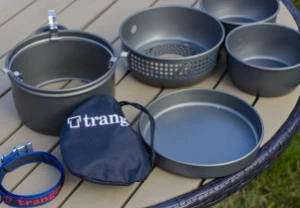
Reinforced Titanium Cookware
Reinforced Titanium Cookware is the process of using an aluminium base which is infused with Titanium. Infusing Aluminium with Titanium increases the strength of the product but also the heat distribution of the cookware.
Reinforced Titanium Cookware has similar properties to Pure Titanium but tends to weigh a little extra. Due to the Aluminum base layer, the pots won’t cool as fast as Pure Titanium, but the heat is more evenly distributed.
Is Titanium Safe to Use?
The simple answer to this is yes; Titanium is safe to use. Tests on Titanium medical equipment have shown it to be non-poisonous and safe for medical procedures. The body has been shown can handle large amounts of Titanium, so using Titanium cookware should not be a problem.
Aluminum Cookware
Aluminum is one of the most abundant (third most commonly found elements in the earth’s crust) and one of the cheapest.
Being an inexpensive metal, it is ideal for making low-cost camping and hiking cookware.
Aluminum Camping cookware is slightly lighter than Titanium but has far superior heat distribution. This means that a pot or pan made from Aluminium won’t have as many hot spots as Titanium, and there is less chance of burning or scalding your food.
Aluminum camping and hiking cookware are perfect for cooking food from scratch. When I say from scratch, I mean using uncooked ingredients and creating your own meals.
The even heat distribution is perfect for cooking as you can simmer food and not have to worry too much about it burning. Aluminum cookware tends to hold onto heat a lot longer, which is great for having your food on a simmer and helps keep food warm when removed from the heat.
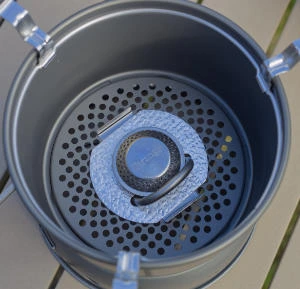
What is Aluminum Cookware made of?
The cheapest Aluminum cookware you can find on the market is made of untreated Aluminum. This cookware is lightweight, heats evenly and is great for people with a budget. The downside, however, is that untreated Aluminum tends to leak into foods which may cause some health concerns.
Untreated Aluminum will also react to acidic foods, again causing Aluminum to leach into your food and will cause the Aluminum to stain and discolour.
The better option is to buy treated Aluminum cookware, preferably an anodized or hard-anodized treatment.
Don’t forget to read my article on Stainless Steel camping cookware. I think looking at the use of Stainless Steel cookware for camping is very interesting.
Anodized Aluminum Cookware
Aluminum, when left out in the elements over time, will oxidize and form a thin layer of aluminium oxide, making it corrosion-resistant.
The process of Anodizing Aluminum speeds up the process of creating this natural coating which is hard, scratch resistant and won’t corrode, peel or chip.
Anodized Aluminum Camping and Hiking Cookware prevent the Aluminum from leaching into your food while protecting your cookware from everyday use while camping.
Hard-Anodized Aluminum is a thicker layer of anodizing that adds more strength and scratch resistance and allows a form of non-stick resistance to Aluminum cookware; it’s not completely non-stick.
Is Aluminum Cookware safe to use?
To be completely safe, I would choose hard-anodized Aluminum cookware to decrease any risk that may be caused by cooking with Aluminum. The Anodising of Aluminum prevents the metal from leaching into food and is much safer than basic Aluminum pans.
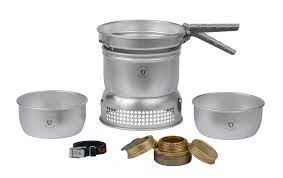
Titanium Cookware vs Aluminum Cookware. Which is Better?
My final thoughts coming from a Chef’s perspective is that for the type of camping I do, primarily cooking meals with uncooked ingredients, Hard-Anodized camping cookware is best.
If I were camping out overnight and wanted to go as light as possible and had ready-to-eat meals, then Titanium Camping Cookware would be best.
If you need camping cookware that only heats water and nothing else, then the benefits of Titanium Camping Cookware outweigh those of Aluminum Camping Cookware.
If boiling water is only for meals, then you will be carrying the smallest amount of food necessary (primarily ready-made meals), and you will be saving weight. The Titanium Cookware matches perfectly with this form of camping or hiking.
If you love cooking as I do or are cooking for multiple people or families, having Aluminum Camping Cookware will suit your needs more. Plus, the benefits of not burning food and listening to your family complain for weeks are huge (yes, even chefs burn, or should I say, caramelize food, sometimes).
There you go, simply put, if boiling water, go Titanium; if cooking food other than ready-meals, go Hard-Anodised Aluminum.
I hope this article gives you more of an understanding of when and where to use Titanium and Aluminum cookware. Going Aluminum will save you cash in the long run, but if weight is a priority, Titanium is your best bet each time.
Outdoor Personal Chef is a participant in the Amazon Services LLC Associates Program, an affiliate advertising program designed to provide a means for sites to earn advertising fees by advertising and linking to Amazon.com. We also participate in other affiliate programs which compensate us for referring traffic.
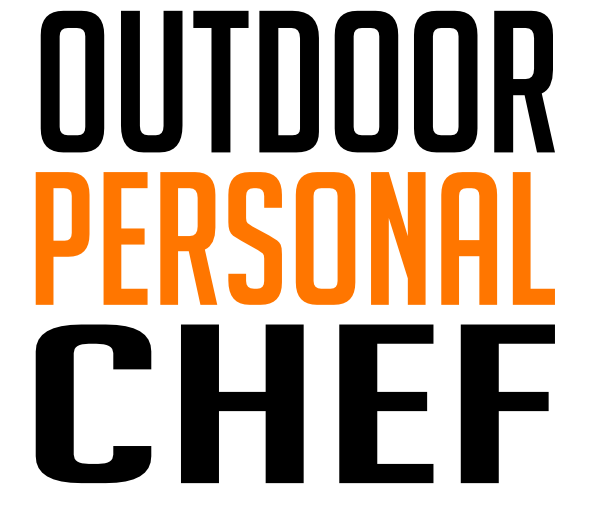
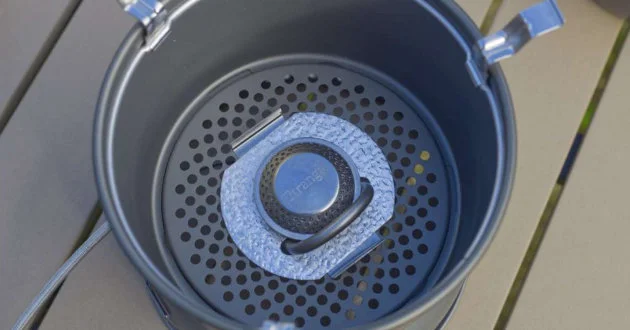
Thanks for this information , I am weary of my untreated aluminium
Pots , and use stainless steal mostly.
I think there may be an aluminium
Pot sake in my next car boot sale !
I just realised the smallest pot in the msr stainless steel pots fits my
Mini trangia fry pan , slight adjustments. Only problem is the three pots are €100 !!!!
Regards Emmet